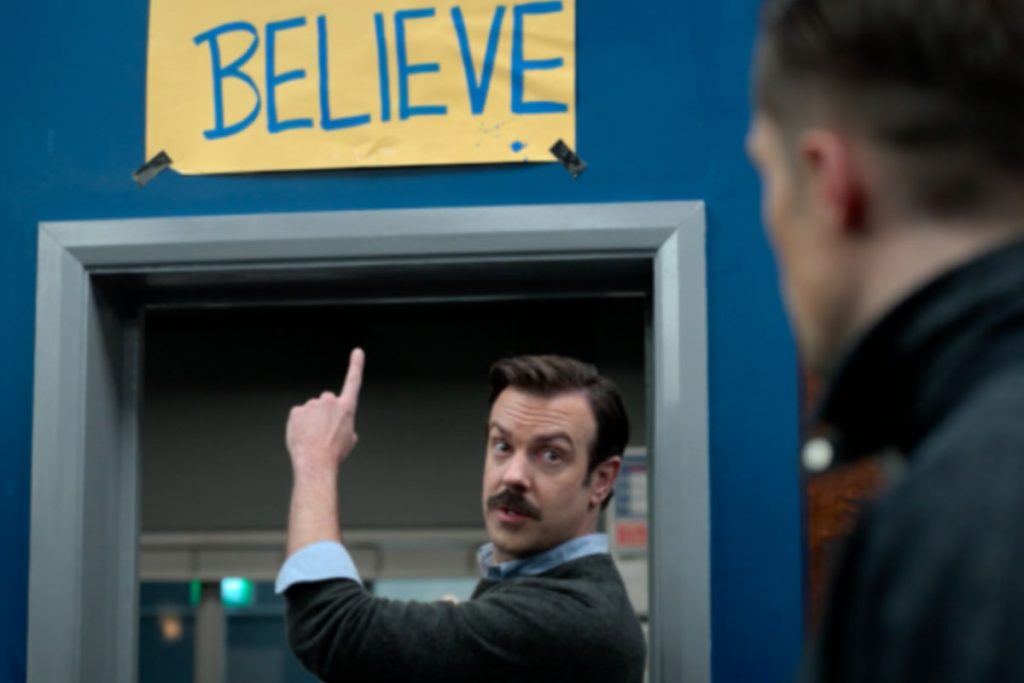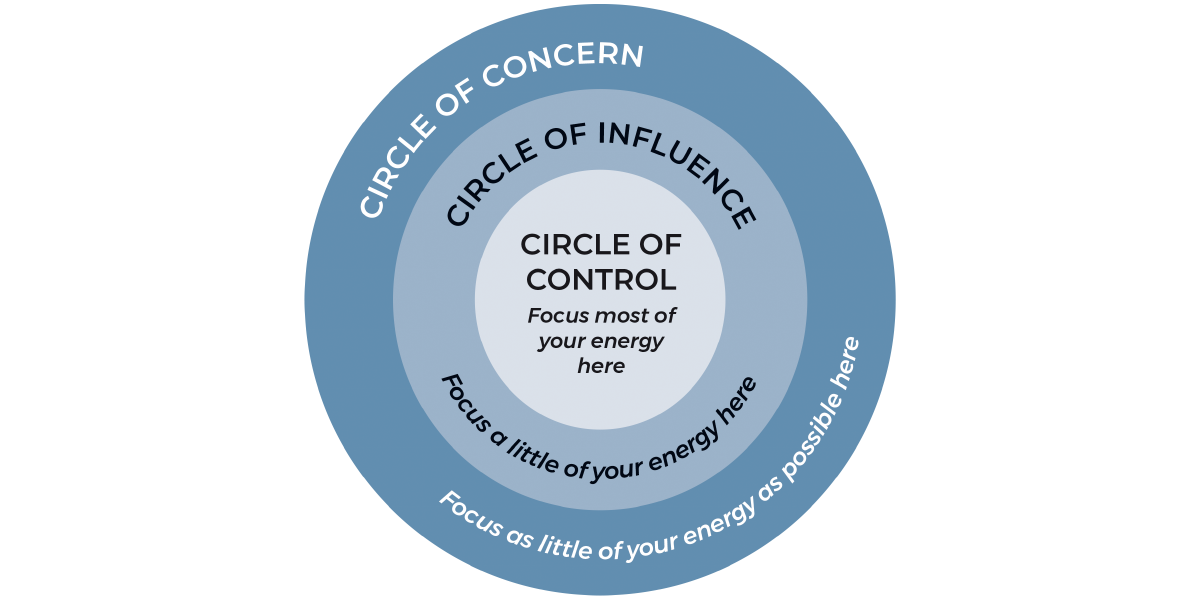Have you been watching Ted Lasso? (You know, the show about the small-time American football coach who’s hired to coach a professional soccer team in England, despite having no experience coaching soccer.)
If so, you’re definitely not the only one. Ted and his unrelenting hopefulness have been a welcome soother for stressed-out brains in a year of uncertainty, lockdowns, COVID frustrations and worries.
Note, I say ‘hopefulness’ and not ‘optimism’. Because while Ted is incredibly optimistic, it is his hopefulness that is his real strength.
What’s the difference?
While optimism can tend to gloss over the realities and challenges of life and sometimes tip over into delusion, hope is pragmatic.
Hope doesn’t pretend challenges don’t exist. It acknowledges that things are hard, but works to provide a way to keep moving forward, even if it’s only a millimetre at a time.
Hope also taps into what we can control while sitting gently with what we cannot.
The opposite of hope is a sense of hopelessness and depression. A sense of being ‘stuck’ and not knowing where to go next. This is obviously a real happiness crusher. And no one enjoys their happiness being crushed.
So with that in mind, here are five ideas for being more hopeful when times are hard.
1. Check your expectations
Expectations … aren’t those the same thing as hopes?
Well, no. They’re not.
An expectation is a strong belief that something will happen.
Expectations are inflexible.
Hope is desiring for something to happen while understanding it might not.
Hope is flexible.
Where hope acknowledges the future is uncertain, with expectations, you are predetermining the future.
Consequently, when expectations aren’t met, this can cause a great deal of unhappiness.
Are you a Melbourne supporter who expects your team to win the AFL Grand Final this weekend? That could be disastrous! Much better to hope than expect. (Although, truth be told, every Melbourne supporter I know is barely allowing themselves to even hope!)
Are you expecting a promotion at your next performance review? Or hoping for one?
Are you expecting a clear run with traffic on the way to work tomorrow morning? Or hoping for that?
A good path towards greater happiness in life is checking your expectations, and where possible and practical, flipping them to being hopes.
2. Focus on the controllables
There are many things in life we don’t have control over. And when we focus on these things, anxiety is usually the result.
When we shift our focus towards what we do control over what we don’t, we move the needle away from anxiety and expectations, back towards hope.
The concept of Circle of Control/Influence/Concern (started by Stephen Covey and expanded on by others) is a good one here. This concept was created to encourage people to be proactive rather than reactive.
Being proactive involves focussing your energy mainly on the things in your Circle of Control: your attitude, how much you’re saving for rainy days, who you spend time with etc.
You can also spend some time focussing on items in your Circle of Influence – things that concern you and that you have a little bit of influence over. (For example, you can’t guarantee you will always have great health, but you can give yourself a good chance by exercising, eating well and sleeping well.)
Meanwhile, it’s best not to spend too much time fretting or trying to impact things in your Circle of Concern. These are the things you worry about, but have absolutely no control at all over, like the economy and weather.
3. Dial into gratitude
If you’re (say) living in Melbourne, enduring your sixth lockdown of the COVID pandemic and someone suggests gratitude to you as an antidote for your current feeling of hopelessness, you’d probably want to punch them in the face.
But a study has shown there is a link between gratitude and hope – which then feeds into happiness.
So, the question then becomes, how does one tap into gratitude in a way that doesn’t feel trite or forced? The answer – focus on the tiny little things.
- The sky being blue after a week of rain
- The smell of your favourite candle
- The cup of tea someone made you that has exactly the right amount of milk
- The way your dog curls up in the crook of your legs when you’re lying on the couch
- Being able to go for a walk and grab some fresh air
There are obviously bigger things to be grateful for – the health of our loved ones, having a roof over our heads and food on the table, financial stability. But when times are hard, it’s often the tiniest things that best allow you to tap into gratitude and boost hopefulness.
4. Limit your exposure
Bad news. Negative people. Anxiety-inducing headlines. All these things can trigger a sense of hopelessness.
While it’s important to stay informed …
And while it’s hard to stay away from negative people we live or work with …
We can limit our exposure to things like daily COVID pressers, newspaper headlines and social media posts from people whose rants always bring our mood down.
Limiting exposure to these things is not a cop-out. It’s a perfectly acceptable strategy for protecting mental health and ensuring our reserves of hope aren’t being eradicated by the negativity of others.
5. Have something you can work towards
Hope is a forward-facing state. In order to foster hope, you need to have something to look forward to. For those of us not in lockdown, we might have holidays, family catch-ups or sporting/fitness goals to call on.
For those who are stuck at home – it’s no surprise that many are undertaking home improvement and lockdown projects. Others are simply working through all eight seasons of the show on Netflix they’ve never wanted to commit to because they didn’t have the time.
Me – if Perth ends up in lockdown again, I have my eye on the 14-book Robert Jordan Wheel of Time series I’ve started many times before but never gotten to the end of.
Ultimately, it doesn’t matter what you’re working towards. It doesn’t need to be ‘worthy’ or ‘productive’ or anything like that. It just needs to be something.
A final note on hope
In the Ted Lasso episode titled The Hope that Kills You, Ted challenges the gloomy attitude of his team’s supporters (who are bracing themselves for disappointment leading into a big game) by declaring:
I believe in hope. I believe in believe.
When you feel hopeless, you also feel stuck. You lose your sense of belief in what’s possible.
My hope for this article is that if you’ve been feeling a little stuck lately, one of the five ideas contained here might be just enough to get you rolling and tapping into possibility again. Once you do get rolling, belief is the momentum that will keep you going.
Good luck!


Wow, really enjoyed this Kel. Well laid out and very practical and sensible ideas anyone can follow. Loved it.
Loved this, Kel. Such wise words.